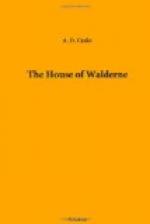Close by stood the parish priest, listening with delight and without that jealousy which too often moved the shepherds of the parochial flocks to resent the advent of the friar. And when Martin at last stopped, exhausted:
“Ye will both come with me, you and your brother, who has been preaching to my little ones, and be my guests this night.”
And they willingly consented.
But we must return to our crusader and his fortunes.
Chapter 15: The Crusader Sets Forth.
The hall of Walderne Castle was brilliantly illuminated by torches stuck in iron cressets all round, and eke by waxen tapers in sconces on the tables. All the retainers of the house were present, whether inmates of the castle or tenants of the soil. There were men-at-arms of Norman or Poitevin blood, franklins and ceorls (churls) of Saxon lineage; all to gaze upon the face of their young lord, and acknowledge him as their liege, ere he left them for the treacherous and burning East to accomplish his father’s vow.
The Holy Land! That grave of warriors! How far away it seemed in those days of slow locomotion.
A rude oak table of enormous strength extended two-thirds of the length of the hall. At the end another “board,” raised a foot higher, formed the letter T with the lower one; and in its centre, just opposite the junction, sat Sir Nicholas in a chair of state, surmounted by a canopy; on his right hand the Lady Sybil, on his left the hero of the night, our Hubert.
The walls of the hall were wainscoted with dark oak, richly carved; and hung round with suits of antique and modern armour, rudely dinted; with tattered banners, stained with the life blood of those who had borne them in many a bloody field at home and abroad. There were the horns of enormous deer, the tusks of patriarchal boars; war against man and beast was ever the burden of the chorus of life then.
And the supper—shall I give the bill of fare?
First, the fish. Everything that swam in the rivers of the Weald (they be coarse and small) was there; perch, roach, carp, tench (pike not come into England yet). And of sea fish—herrings, mackerel, soles, salmon, porpoises—a goodly number.
Secondly, the birds. A peacock at the high board, goodly to look upon, bitter to eat; two swans (oh, how tough); vultures, puffins, herons, cranes, curlews, pheasants, partridges (out of season or in season didn’t matter); and scores of domestic fowls—hens, geese, pigeons, ducks, et id genus omne.
Thirdly, the beasts. Two deer, five boars from the forest, come to pay their last respects to the young crusader; and to leave indigestion, perhaps, as a reminder of their fealty. From the barnyard, ten little porkers, roasted whole; one ox, four sheep—only the best joints of these, the rest given away; and two succulent calves.
Of the pastry—twelve gallons cream, twenty gallons curds, three bushels of last autumn’s apples were the foundation; two bushels of flour; almonds and raisins. Yes, they had already got them in England.




